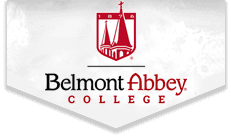- the fundamentals of legal studies that will prepare a student for law school
You’ll enjoy the Abbey’s pre-law minor if you:
- wish to study law or law enforcement
- are interested in legal systems and court cases
Belmont Abbey College’s pre-law Minor is specifically intended to help students who plan to attend law school after they graduate. In this program, you will:
- take a liberal-studies approach to government and law
- have a virtue-based foundation in legal studies
Today computers and the internet are essential resources in almost any field. Earning a minor or concentration in computer studies from Belmont Abbey College will teach you to tap into those resources and effectively employ computer technology in your career.
- law school
- legal careers
The pre-law minor is built to prepare you for law school and legal careers, but the knowledge of legal procedure you gain by minoring in pre-law can greatly benefit any profession.
The Abbey Difference:
Guided by the tenets of Catholicism and the Benedictine hallmarks, Belmont Abbey College strives to provide its students with a well-rounded education that promotes wise and ethical decisions. The pre-law minor combines courses in constitutional law with study of criminal courts, psychological statistics and business law, helping students who hope to continue their legal studies as well as grow in their understanding of law and virtue.
Program Requirements:
- PO 309 Constitutional Law I
- PO 310 Constitutional Law II
Any three courses from the list below:
- PH 202 Introduction to Logic
- PO 311/CJ 311 Moot Court
- CJ 355 English Roots of American Law
- CJ 360 American Criminal Courts
- CJ 370 Criminal Procedure
- CJ 450 Trial Advocacy
- BU 412 Legal Environment of Business
- PC 300 – Statistics for Psychology
Note: CJ201 is prerequisite for students wishing to take CJ 302, CJ 355, CJ 360, or CJ 370.
Certain majors are usual precursors to law school. We recommend majoring in English, History, or Government and Political Philosophy, because these disciplines hone the particular skills needed for success in law school. However, since a high cumulative grade point average in a student’s undergraduate studies considerably improves his or her chances for admission to any law school, students should major in any field that genuinely interests them and in which they excel.
Program Coordinator:
Dr. Stephen Ward
Assistant Professor of Criminal Justic
B.A. North Carolina State University
J.D. Mercer College
Pre-Law Resources:
Highlights of your experience:
These courses highlight the some of the ideas you will consider as a government major at Belmont Abbey College.



